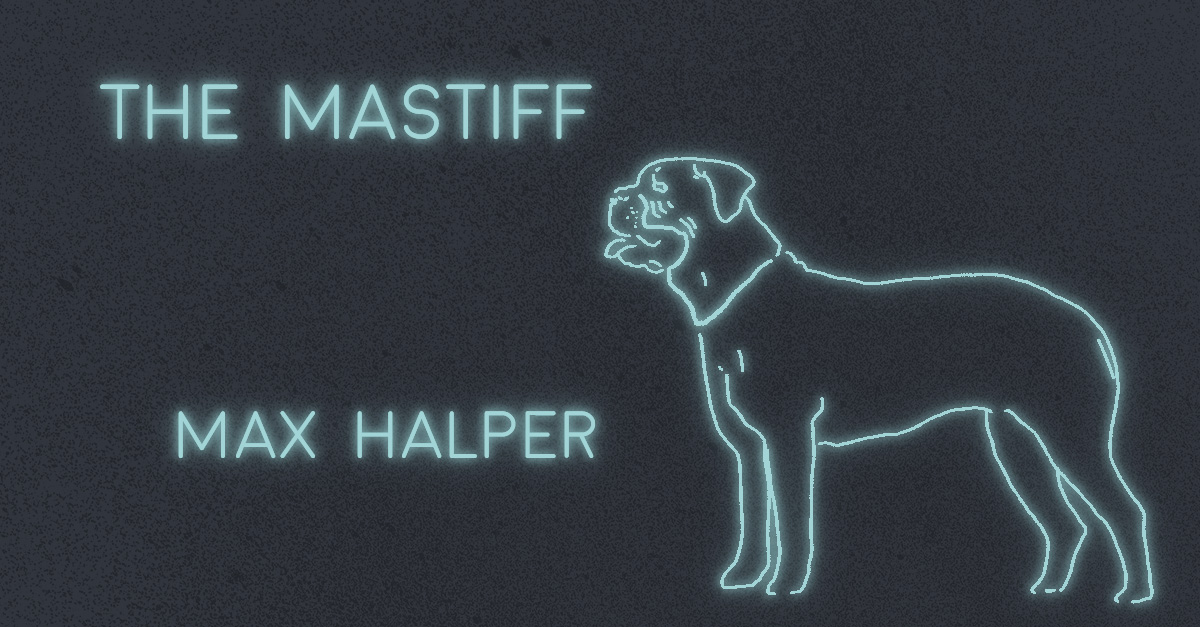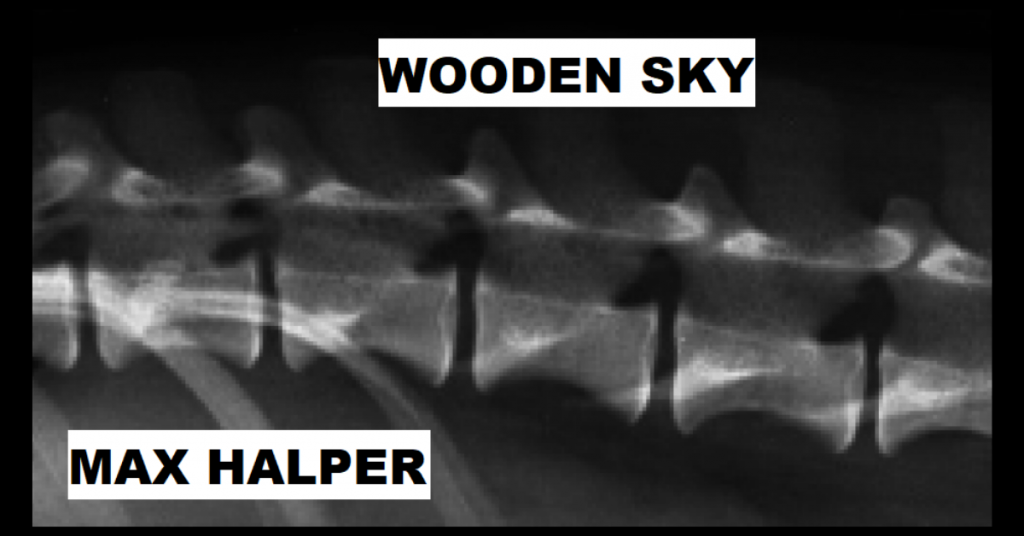
THE MASTIFF by Max Halper
“My life is over,” I said in the dark my first night inside.
A full minute passed. “Shut the fuck up,” said my cellmate.
A month later I hanged myself. I did it from the bunk with my undershirt. There was no pain. My cellmate slept through it. When he woke up I was so dead I seemed more a facet of the cell than an occupant. He looked at me and nodded, as if my body imparted some keen insight. He determined I had managed to escape, had bored a tunnel through the only wall in the prison they could not reinforce. Now I scrambled toward freedom, through darkness on hands and knees, driven by desperate hope, spying a glint of light, quickening—only it wasn’t light, but a trick of the eye, and the darkness twisted onward. My cellmate relocated my commissary to his side of the cell, and then sat on his bunk and waited for the doors to open for roll call.
The way time worked inside was tricky: it smeared, pooled. Coagulated. Time curdled in prison. Then again, it was possible that time worked like this on the outside too. My cellmate could not remember. Sometimes he counted in his head, to try and stabilize the time, to ground it. He counted slowly. If he stopped counting, or ran out of numbers, the time would disfigure. He counted then, there on his bunk, waiting for the doors, my body hardening beside him.
Four years later he was released. They excavated his property from storage and led him out through door after door. The doors locked shut behind him. It was late November. The sky was the same gray as the prison’s interior. A van pulled up to take him to the bus. He climbed into the passenger seat and the van drove down a road he remembered only vaguely, as if from a dream. In the side-view mirror, the edges and angles of the prison distilled into points and counterpoints. The gray sky crashed over it all and the road buckled. A car whooshed past in the opposite direction, full of people.
“Something happened,” the ticket agent said. “Down in the city. No buses that way.”
My cellmate shook his head. “I’ll just take whatever’s going south.”
“No buses south,” she said. “You’re going to have to wait.”
My cellmate stood aside. A television mounted to the wall ran ads for cars and drugs. A woman on a bench near the bathrooms gawped into her phone. A pair of children chased one another along the perimeter of the terminal, their sneakers squealing on the concrete floor. A teenaged boy leaned across the counter at the convenience kiosk and whispered to the teenaged girl tending the register. A man in a suit slept on a bench beneath the television, surrounded by suitcases. My cellmate tried to determine what each of them was in for.
An hour later the ticket agent announced that all buses were cancelled indefinitely. My cellmate went to the door of the terminal and waited for a guard to release it. It doesn’t work like that here, he reminded himself. It was cold enough to snow; the sky whorled off into tangled sheets of gray. A bus driver stood beside a concrete pillar, smoking. “Which way is south?” my cellmate asked.
The bus driver jerked his head.
My cellmate walked off without anyone’s permission. Something akin to homesickness gathered at the base of his skull.
He walked along the shoulder. The road essed through a corridor of rufous trees. Acorns skittered around his feet. He had a dream while still inside that he walked along the shoulder of a country road in late autumn. He didn’t know where he was going, or where he’d been. He just walked, my cellmate, then he woke up in his cell. He remembered this dream only now, and felt suddenly unbalanced, as if the whole thing had listed to the side. He counted in his head; when he ran out of numbers, he told himself, his eyes would open, and he would be back inside.
No trains running southbound. No trains running at all. It was too late to keep walking. My cellmate had the $160 he’d gone in with plus the $150 in gate money they’d handed him on his way out. He got a room at a motel by the station. The room had two twin beds. He sat on one, then the other. He watched the door. The room sloped endlessly in all directions. His shadow spiraled along his arms. That night he dreamed he crawled through a tunnel toward a guttering light. The tunnel emptied into his cell. He lay on his bunk and fell asleep and woke up in the motel. It was still dark. He parted the curtains. A light on the solitary telephone pole by the road revealed a veil of languid snowflakes. There were no cars in the motel lot. He drank from the faucet, pocketed a bar of soap from the shower. He waited at the door.
He walked south along the train tracks. Snow gathered in his hair and across his shoulders. Daylight stole uncertainly around the crests of the trees; sometimes it seemed to retreat, and grow darker.
White sky, blue air, purple trees. My cellmate could not feel his toes. One-thousand-nine. One-thousand-ten. A silence of geese scored through the falling snow. Ahead, the train tracks disappeared into the mouth of a tunnel at the base of a speckled mountain. One-thousand-eleven. My cellmate took long steps. His breath bled through the cracks in his lips. The mountain was affixed at its distance. One-thousand-twelve. He curled his arms around himself. One-thousand-thirteen. One-thousand-fourteen. The snow flitted. The mountain maintained its size and shape.
It was impossible to determine for how long he walked through the tunnel. A full minute. Twelve years. It was pitch-black. He felt along the cold, rough wall. He counted, but the distance between each number—One-thousand-four-hundred-twenty-four, one-thousand-four-hundred-twenty-five—was immeasurable. The tunnel twisted onward. Years ago there was a blackout in the prison. It lasted days. The inmates were not allowed candles, and the staff refused to part with their precious supply of flashlights. There was disconcertion. One of the inmates, Gideon, a cop-killer, suggested they all tell stories to pass the time. Most of them grumbled off to their cells. The few remaining gathered in the dark dayroom. Gideon asked who wanted to go first, but no one volunteered.
A dog trailed him along the train tracks. When he stopped, the dog stopped, expressionless in the uneasy snow.
The shops, restaurants, and single motel in Wallkill were closed. He slept in the stairwell of a stout brick building off the main street. A man came down the stairs, paused and looked at him, then left into the dark morning. My cellmate continued south soon after. The clouds broke apart, and the sky behind was pale. The train tracks ran along a ridge overlooking the highway and the river. Cars traveled only northbound. Further along the traffic hardened, until the whole thing came to a standstill. Where the river crooked sharply east, two jets screamed suddenly from the north, scored through the sky so low my cellmate ducked, and thundered off toward the horizon. Later, he beheld a swarm of helicopters affixed high overhead, black specks biding their distance. He felt assailable below.

